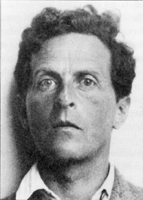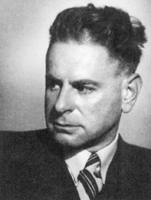The Philosophical Poker
October 7, 2002

Ludwig Wittgenstein (1889-1951) was brilliant, eccentric, egotistical, ascetic, . . . "incandescent with intellectual passion." He and Popper were two of the most famous philosophers of their generation.
Philip J. Davis
Wittgenstein's Poker. By David Edmonds and John Eidenow
Ecco: Harper Collins, New York, 2001, 340 pages, $24.00.
The date: Friday, October 25, 1946.
The time: 8:30 P.M.
The place: Staircase H, No. 3, Gibbs Building, Kings College, Cambridge, England. The rooms of Professor Richard Braithwaite.
The occasion: Meeting of the Moral Science Club, Professor Ludwig Wittgenstein, Chairman; Wasfi Hijab, Secretary.
The speaker: Dr. Karl Popper, Reader in Logic and Scientific Method, London School of Economics.
The topic: "Are there philosophical problems?"
Among the thirty or so present: Bertrand Russell (logician and philosopher), Richard Braithwaite (philosopher), George Kreisel (mathematician), Sir John Vinelott (judge), Stephen Toulmin (philosopher), Michael Wolff (historian), Peter Geach (logician), the guest speaker, the chairman, the secretary, and numerous students. No members of the media were present. No paparazzi.
The incident: (As in the movie Rashomon, there are contradictory versions of what happened.) The following short and sensational version is my personal collage. Popper started his talk. Wittgenstein disagreed with practically everything that Popper said. At one point Wittgenstein could not contain his fury. He grabbed the poker from the nearby fireplace and brandished it, either (1) threatening the speaker with the poker, (2) using the poker to illustrate a philosophical point, or (3) allaying his anger by this physical gesture. Bertrand Russell took his pipe from his mouth and cried out, "Wittgenstein, put down that poker." Wittgenstein dropped the poker onto the floor and rushed out of the room, slamming the door behind him.
The outcome: Popper offered as an example of a moral principle: Do not threaten visiting lecturers with a poker. Also: much gossip.
Edmonds and Eidenow have provided considerable detail about the lives and ideas of Ludwig Wittgenstein (1889-1951) and Karl Popper (1902-1994). Following a biographical tradition set by Plutarch, I present here a thumbnail "compare and contrast":
Family background: Both were born in Vienna, Wittgenstein into one of the richest families in Austria. Popper's father was an upper-middle-class lawyer. Both were the sons of assimilated, converted Jews. This did not help them when they came up against Nazi racial laws.
Personality: "Both were bullying, aggressive, intolerant, and self-absorbed." Wittgenstein was brilliant, eccentric, egotistical, and ascetic. He was "incandescent with intellectual passion." He gave away his considerable fortune. He couldn't stand honors. Reclusive. Unmarried. Believed to be gay.
Popper was brilliant, insecure and arrogant, self-righteous, disputatious. Supremely egotistical, he had to win an argument at whatever the cost. Married but no children.

Karl Popper (1902-1994) was brilliant, insecure, arrogant, disputatious. Unlike Wittgenstein, he had substantial mathematical training. Photos from Wittgenstein's Poker.
Mathematical training: Wittgenstein, adequate; Popper, substantial.
Avocations: Music, architecture, and design for Wittgenstein; music for Popper.
The World Wars: Wittgenstein served in the Austrian Army in World War I. Wounded and taken prisoner in Italy, he was later medalled. As a teenager during World War I, Popper was against the war but couldn't express his opinion openly.
During World War II, Wittgenstein worked as a hospital aide in South London and Newcastle. Popper was in exile in New Zealand, "from where he helped to organize the escape of some forty Austrian refugees."
Philosophy: Wittgenstein had a mind like a sharp needle. Apolitical. Mystic. Challenged current popular philosophy, particularly that of Russell, his mentor. He came to think that philosophy was nothing but a language puzzle.
Popper's mind was like a broad mallet. He challenged Plato, Hegel, and Marx. Developed "fallibilism": In science, you can't prove anything. You can only disprove.
Professional output: Wittgenstein, one book plus articles; limited in scope (logic, language). Popper, many books and articles; philosophy of science, social and political concerns.
Last place of employment: Wittgenstein, Professor at Cambridge University. Popper, Professor at the London School of Economics.
Reputation: Wittgenstein and Popper were two of the most famous philosophers of their generation. Wittgenstein became an alluring cult figure, aided by the fact that few can say with certainty what his views really were.
Popper won many honors. He was knighted in 1965. Popper's "name is fading, if not yet forgotten. This, admittedly, is a penalty of success rather than the price of failure."
Famous opinions:
Wittgenstein: "Wovon man nicht sprechen kann, dar�ber muss man schweigen." (If you can't talk about something, shut up.)
Popper: Fallibilism---a theory is scientific only if, in principle, it is capable of being tested and of standing the risk of refutation.
Wittgenstein's Poker is an easy and often amusing read. The authors, both journalists with the BBC, have done a great deal of homework, in the form of interviews and so forth. Readers will learn a fair amount about the thought of these two remarkable subjects and of the historical-cultural Viennese background of their early lives. The book describes the members and the precepts of the "Vienna Circle" of logical positivists, against which Wittgenstein chafed and Popper rebelled. Readers will also be subjected to more than a bit of tittle-tattle, some of which may be true.
*****
Since the particulars of the argument that raised high the poker (what is philosophy?) would take me well beyond my allotted space, I change direction here with a few words about why I think that mathematicians by and large hate or avoid philosophy. In support of this claim, consider:
"Mathematicians seldom discuss the philosophical issues surrounding mathematics; they assume someone else has taken care of this job. . . . The professional philosopher, with hardly any exception, has little to say to the professional mathematician."---Reuben Hersh, Some Proposals for Reviving the Philosophy of Mathematics.
Although I do not think of myself a philosopher, I was invited to address the Philosophy Colloquium at Oxford some years ago. Flattered, I accepted, but with considerable trepidation. I was worried for two independent reasons. In the first place, Oxford was then a hotbed of what has been called analytic philosophy, and this was not for me. I would be confronted with a hostile audience.
In the second place, I had picked up the notion that professional philosophers love to argue in public. In an act of public refutation and humiliation, they can reduce a speaker's position to ashes and dust. They do this with glee and self-satisfaction. This tradition is derived from classical times, when the Greek philosophers soapboxed in the Agora. And the Oxbridge philosophers have honed their mouse-trap minds and razor-sharp disputative skills at the college high tables, while well soaked in sherry, port, and Malaga.
Now while I pride myself that I can hold my own against fellow diners in high table repartee, when it comes to a public defense of my position while standing at the lectern, I am slow, dull-witted, and confused. My feeling is this: If someone doesn't like what I've said, let him or her give me a copy of his or her books or articles, which I will then be in a position either to respond to or to ignore in tranquillity. Thus it was that in the late afternoon of the day of my talk, I walked over to the Oxford Philosophy Department with some fear and trembling.
Who might be among my audience? I hardly knew the names of the current Oxford philosophers. But the walls of the lecture room, I was sure, would be saturated with the words of the past great: G.E. Moore, J.L. Austen, Gilbert Ryle. Would Peter Strawson be there? I knew the well-limelighted Alfred Ayer very slightly. Would he come to my talk, or was he in London displaying his wit on the BBC's Brains Trust show? I knew the name of the famous novelist-philosopher Iris Murdoch. She was a platonist. I was an anti-platonist. Would she be there and heckle me? I knew about Isaiah Berlin, whose head, among all his contemporaries, I considered to be screwed on most soundly. Would he be there? Well, come what may, I would make out.
I said my piece, and a standard pro forma applause---like a limp handshake---came at the end. It was now time for the audience to hit me with questions. And hit me they did. I shrank. I did what I could, but I felt the cold dismissiveness of my questioners.
And then something happened that changed the nature of the event. Two men in the audience, call them Dr. A and Dr. B, for I know not who they were, began to argue among themselves. Their spoken paragraphs were long and complex. Their rejoinders were deep and non-understandable. I stood behind the lectern and tried to get in a word of reconciliation. I was not able to do so.
I lost control of the session. The two disputants on the floor were joined by a third. Dr. C., I presume. The philosophical donnybrook went on and on.
It was now approaching 6:15. I lost patience. I raised my voice to boombox level and said to one and all, "Please excuse me. My wife is expecting me. But do go on with your discussions." And I quickly walked out of the lecture room and into the usual rain.
For all I know, the discussion may still be going on. But this was a mild performance compared with what transpired in H3 on October 25, 1946.
Mathematicians on the whole don't argue. We tend to agree widely among ourselves as to what we have come up with. It is part of our unconsciously held philosophy that if we've worked out something, proved something, then there it is. It may interest you or it may not. Take it or leave it. Mathematicians tend toward universality as an ideal and hope it can be achieved. On the other hand, philosophers of mathematics do argue, and argue violently (even about the universality of mathematics).
*****
Let me return to the poker. Reading Edmonds and Eidenow's book, I got interested in the fate of the Wittgenstein poker. I got in touch with Katherine Whybrow (n�e Braithwaite), a mathematical educator and daughter of Richard Braithwaite. She is a friend whom I have known for a number of years. I asked her what happened to her dad's poker. Here is her answer:
"The only time I heard about the poker was in the 1980s when Dad took me into King's College High Table and we sat next to the sociologist Ernest Gellner who talked about the poker and offered to buy it off Dad. Later, when I asked Dad why not sell it, Dad said that he had long since got rid of it. He didn't want it to become a philosophical religious object or icon. Dad was brought up Quaker and preferred to make peace not glorify violence."
I believe that eventually Wittgenstein's poker will surface. When it does, I'll put in a bid. I want it for my Museum of Philosophical Objects. At the moment, my museum contains, among other things, Occam's Razor, Dr. Johnson's Stone, Schr�dinger's Cat, and two shadows from the wall of Plato's Cave.
Philip J. Davis, professor emeritus of applied mathematics at Brown University, is an independent writer, scholar, and lecturer. He lives in Providence, Rhode Island, and can be reached at [email protected].

